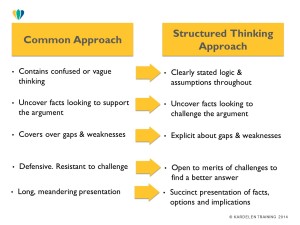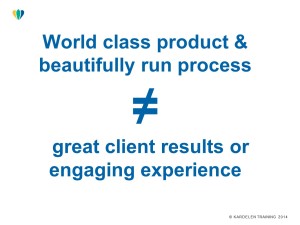We rely on our teams to help us solve problems, make good decisions, present to customers and build our businesses, but the output we get from our teams can be frustratingly inconsistent.
Common issues include:
- Problems raised with no solution
- Arguments based on hearsay and opinion
- Incomplete stories
- Lack of rigorous thinking
- Resistance to valid challenges
- Long, confused presentations
Structured Thinking & Presenting teaches people to approach questions openly and logically, to challenge and uncover a better solution, and to present conclusions succinctly.

To help your team to think and present in a structured way, helping you to make easier, better decisions, see Kardelen’s Structured Thinking & Presenting
Not many SMEs grow to any material size at all. If you take 100 typical UK companies, 2 of them have more than 20 employees, 1 of them has more than 50.
But small businesses that have private equity investors grow reliably into the rare 1% with more than 50 employees and then beyond. They consistently outperform their non-PE peers in employment growth, earnings growth, productivity, and (lower) default rates. There are plenty of exceptions to this sweeping observation, but that’s the trend and if you look at the evidence it’s a compelling one. Looking from the outside though, it’s a puzzling one. How do investors who have virtually no sector experience, virtually no executive experience, whose main input is to sit as a non-Exec on the Board once a month, who take out chunky fees, and who rarely stay involved with the business for more than a handful of years, make such a big difference?
Kardelen’s research found that one of the key benefits of private equity investment is the prompt to create a performance environment that allows a promising company to grow reliably and beyond its historical constraints. Surprisingly, this labourious task is largely left to chance, reliant on the team’s ability to adopt the performance disciplines, and the investor’s ability to provide and prompt a suitable performance environment and support structure.
We think that investors and investees can establish performance environments much more quickly and reliably than they do today, but only if the investees understand from the outset what a performance environment looks like, and if investees have the skills to implement it instead of working things out as they go along.
We offer two services to make this happen. In our first service, we diagnose the gaps in investees’ environments, and give the senior team training in all relevant areas of weakness so that they can become adept at developing their own performance environment with no lost time and no need for luck. In our second service, we work with the management team with its strategic plan immediately after investment, prompting the team to include all the important business building steps from the outset.
For more information see:
http://kardelen.training/courses/fast-tracking-a-performance-environment/
http://kardelen.training/courses/long-term-planning-for-a-valuation-event/

Have you ever thought you had a fantastic solution but struggled to get client buy-in? Have you ever had a difficult client who is hampering the process? Ever had to deal with managing a mistake from your team or with a highly emotionally charged unhappy client?
Relationships with your clients, both internal and external, bring a raft of challenges. But without your clients’ engagement and buy in, your work won’t be valuable and your clients won’t return.
Kardelen’s new module, Improving Client Results, helps our training participants bridge the gap to turn a great product and process into excellent results and an engaging experience for their clients. We cover the core mindset that leads to excellent client results, simple steps to make common client meetings more valuable, how assertiveness generates respect and leads to a better solution, how to work with clients who have roles in your project delivery, and we practise a simple process to handle client issues well in a series of typical challenging client situations.
For more information click here

